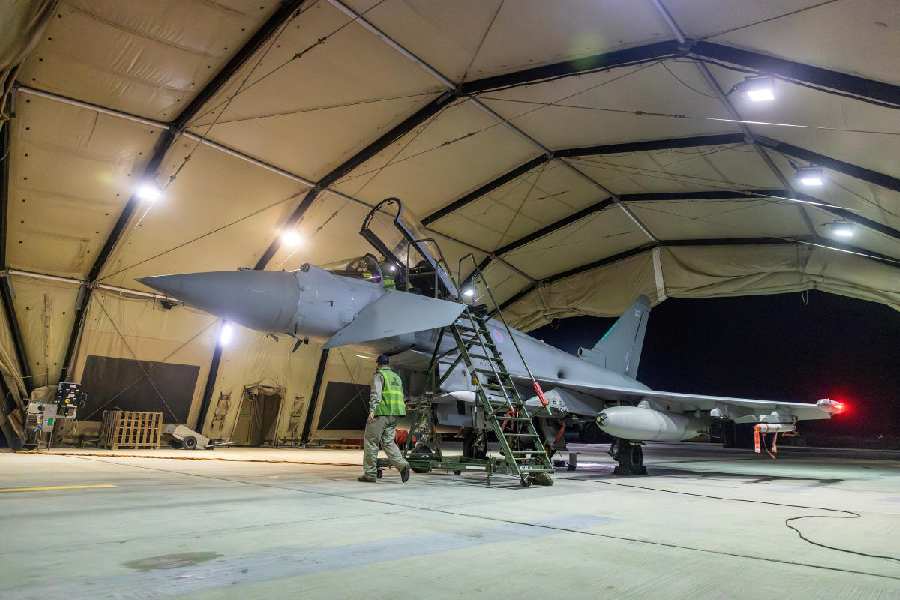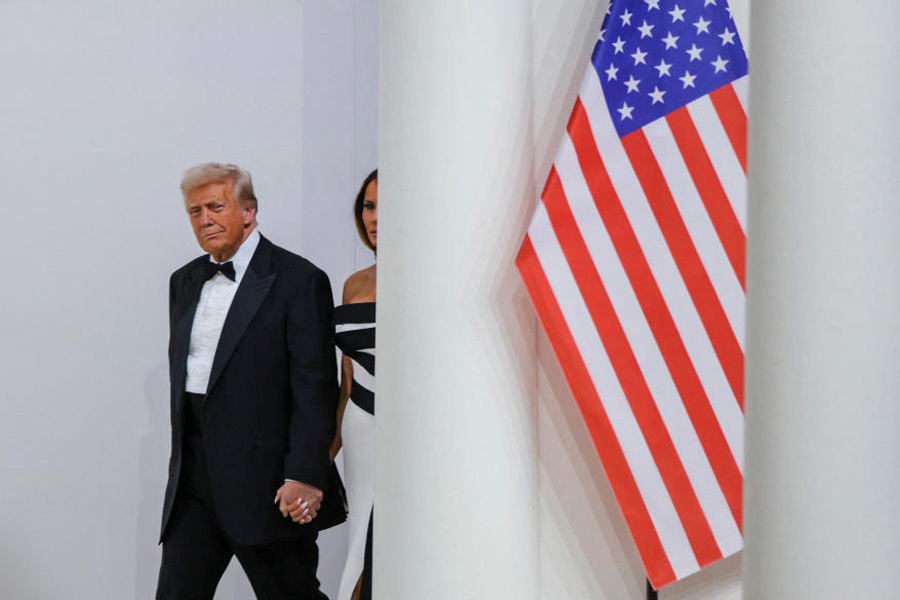US-led airstrikes on Yemen's Houthi rebels in response to their attacks on Red Sea shipping pulled the world's focus Friday back on the years-long war raging there, even as tensions rise across a Middle East already torn by Israel's war on Hamas in the Gaza Strip.
The strikes killed at least five people and wounded six, the Houthis said, without elaborating on what was targeted.
As the bombing lit the predawn sky over multiple sites held by the Iranian-backed rebels, Saudi Arabia quickly sought to distance itself from the attacks as it seeks to maintain a delicate détente with Iran and a cease-fire in the Yemen war from which it hopes to finally withdraw.
The attack also threatened to ignite a regional conflict over Israel's war on Hamas, which the Biden administration and its allies have been trying to calm for weeks.
Meanwhile, the US Navy acknowledged an attack days earlier on a ship in the far reaches of the Indian Ocean — an attack that may signal Iran's willingness to strike vessels as part of a wider maritime campaign over the Israel-Hamas conflict.
Tehran on Thursday separately seized another tanker involved in an earlier crisis over America seizing oil targeted by international sanctions on the Islamic Republic's nuclear program.
It remained unclear how extensive the damage from the US strikes were, though the Houthis said at least five sites, including airfields, had been attacked.
The United Kingdom described its strikes hitting a site in Bani allegedly used by the Houthis to launch drones and an airfield in Abbs used to launch cruise missiles and drones.
Hussein al-Ezzi, a Houthi official in their Foreign Ministry, acknowledged “a massive aggressive attack by American and British ships, submarines and warplanes."
“America and Britain will undoubtedly have to prepare to pay a heavy price and bear all the dire consequences of this blatant aggression,” al-Ezzi wrote online.
Mohammed Abdul-Salam, the Houthis' chief negotiator and spokesperson, separately described the US and Britain as having “committed foolishness with this treacherous aggression.”
“They were wrong if they thought that they would deter Yemen from supporting Palestine and Gaza,” he wrote online. Houthi “targeting will continue to affect Israeli ships or those heading to the ports of occupied Palestine,” he wrote.
Since the attacks began in November, however, the Houthis have begun targeting vessels with tenuous or no clear links to Israel, imperiling shipping in a key route for global trade.
The Houthis' military spokesman, Brig. Gen. Yahya Saree, in a recorded address, said 73 strikes hit five regions of Yemen under their control, killing five and wounding six. He did not elaborate on who was killed.
“The American and British enemy bears full responsibility for its criminal aggression against our Yemeni people, and it will not go unanswered and unpunished,” Saree said.
In Saada, the Houthis' stronghold in northwest Yemen, hundreds gathered for a rally Friday. The crowd shouted at times the Houthi slogan: “God is the greatest; death to America; death to Israel; curse the Jews; victory to Islam.”
Yemen has been targeted by US military action over the last four American presidencies. A campaign of drone strikes began under President George W. Bush to target the local affiliate of al-Qaida, attacks that have continued under the Biden administration.
Meanwhile, the US has launched raids and other military operations amid the ongoing war in Yemen.
That war began when the Houthis swept into the capital, Sanaa, in 2014. A Saudi-led coalition including the United Arab Emirates launched a war to back Yemen's exiled government in 2015, quickly morphing the conflict into a regional confrontation as Iran backed the Houthis with weapons and other support.
That war, however, has slowed as the Houthis maintain their grip on the territory they hold.
The UAE even came under Houthi missile fire multiple times in 2022. After the Emirates left the war, Saudi Arabia reached a Chinese-mediated deal with Iran to ease tensions in hopes of finally withdrawing from the war.
However, an overall deal has yet to be reached, likely sparking Saudi Arabia's expression Friday of “great concern” over the airstrikes.
“While the kingdom stresses the importance of preserving the security and stability of the Red Sea region, ... it calls for restraint and avoiding escalation,” its Foreign Ministry said in a statement.
Iran, which has supplied weapons and aid to the Houthis, condemned the attack in a statement from Foreign Ministry spokesperson Nasser Kanaani.
“Arbitrary attacks will have no result other than fuelling insecurity and instability in the region," he said.
The Lebanese militant group Hezbollah, also backed by Iran and engaged in cross-border fire with Israel, criticized the strikes as showing America as being a "full partner in catastrophes and massacres committed by the Zionist entity in Gaza.” Hamas as well condemned the attack.
In Beijing, Chinese Foreign Ministry spokeswoman Mao Ning called on nations not to escalate tensions in the Red Sea, asking all countries and parties to exercise restraint.
“We hope that all parties concerned will play a constructive and responsible role in the security and stability of the Red Sea region, which is in the common interest of the international community,” she said.
The Red Sea route is also crucial for energy shipments. Benchmark Brent crude traded up some 2.5 per cent Friday at over USD 79 a barrel.
Meanwhile Friday, the US Navy confirmed an attack days earlier near the coasts of India and Sri Lanka. The chemical tanker Pacific Gold was struck January 4 by what the Navy called “an Iranian one-way attack” drone, causing some damage to the vessel but no injuries.
“Iran's actions are contrary to international law and threaten maritime security and stability,” said Vice Adm. Brad Cooper, the head of the Navy's Mideast-based 5th Fleet.
The Pacific Gold is managed by Singapore-based Eastern Pacific Shipping, a company that is ultimately controlled by Israeli billionaire Idan Ofer. Eastern Pacific, as well as naval officials in India and Sri Lanka, had not responded to multiple requests for comment from The Associated Press over the attack. Eastern Pacific previously has been targeted in suspected Iranian attacks.
A private security official previously acknowledged to the AP that the attack took place. The attack had been first reported by the Lebanese broadcaster Al-Mayadeen, a channel politically affiliated with Hezbollah that has previously announced other Iran-linked attacks in the region. Iran itself has not acknowledged carrying out the attack.











